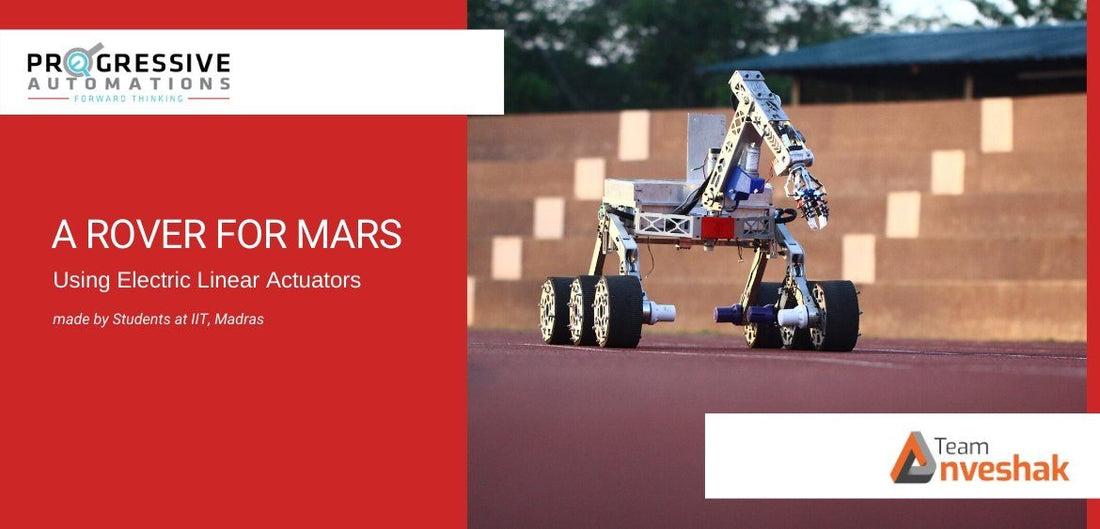Teams from around the world compete at the University Rover Challenge (URC), held each year in the desert of Southern Utah in the United States. Student teams compete to design and build the next generation of Mars rovers that will one day work alongside astronauts exploring the Red Planet.
One such team that has stood out for us is Team Anveshak from IIT, Madras, India. The group of over 20 student engineers is on a mission to build the next generation of a Mars rover prototype to compete in the rover challenge series. Team Anveshak has competed in the past with their debutant Rover – the Aurora (2017) followed by the Badger (2018). The design of their first rover featured a 6-wheel design with a modified rocker-bogie suspension system, custom-manufactured aluminum wheels, and a manipulator mounted on 2 separate points to improve stability and provide weight distribution.
The design of Badger rover moved to a 4-wheel design that saw the implementation of a steering mechanism and several other additions to the chassis box and the manipulator. The Badger design competed at URC 2018 and finished 25th out of over 80 teams from across the world.

Experience at URC 2019
The Rover Challenge last year saw 84 teams from 13 countries participating. After a rigorous two-stage down-selection process, 36 teams were invited for the exciting rover challenge in the Utah desert and team Anveshak was excited to be selected to compete. “The competition provided us with a completely new learning experience. The dedication, passion, and ingenuity shown by each of the student teams have motivated us to work harder and keep improving,” said Sneha Srikanth, design engineer, Anveshak. The competition was a great platform with the best teams competing to showcase their rover prototypes, “Various teams came up with different ideas to tackle the problem statement. Interacting with these teams gave us insight into how we can improve our rover by implementing innovative mechanisms.” Moreover, the team received valuable feedback from companies such as Protocase, Honeybee Robotics, Microsoft and NASA Ames Research center.
Seize the day with the new rover design – ‘The Caesar’
To compete at the upcoming URC scheduled to be held from May 28th to May 30th, team Anveshak has worked tirelessly on upgrading the rover. “Our primary aim was to design mechanical systems with less play/ backlash, reduce the weight of the rover without compromising on its strength and improve its stability. We also redesigned some components to better suit the given problem statement. With respect to electronics subsystems, we aimed to make more compact, efficient and modular PCBs that could be easily installed on the manipulator of the rover,” said Sneha Srikanth.

Taking from their learning at URC 2019, the new and improved rover features a 6 wheeled rocker-bogie with custom wheels and an amazing ground clearance of 40 cm. A new electronic system was built to make sure that the rover can operate seamlessly. With the introduction of new software, the rover has improved control and capabilities.
Using Electric actuators
The engineers further enhanced and improved the design by introducing electric linear actuators sponsored by Progressive Automations. The team used Progressive Automations PA-14 customized linear actuator on the elbow of the manipulator to provide a greater range of motion.
“The actuator has equipped our manipulator with much-needed power and precision enabling us to handle a variety of objects. The smooth functioning of the actuators and minimal play and zero back driveability ensures efficient control of our manipulator,” said Sai Venkat, team lead, Chassis lead. “The PA-14 customized actuator satisfied all our requirements, providing sufficient range and torque at optimum speed. It is compact, lightweight and we were able to integrate it seamlessly with the rest of the manipulator,” he added.
The actuator has well exceeded our expectations and operated perfectly even with rigorous testing under harsh conditions. It is highly robust and reliable. Overall, it improved the performance of the rover's manipulator.

Future Plans for Team Anveshak
The team of students from the Centre for Innovation at IIT Madras is ambitious and hardworking with a vision to apply their academic knowledge to innovate and propose solutions to real-world problems. The team is also looking to collaborate with some of the best research organizations of India such as the Indian Space Research Organization (ISRO) & the Defense Research & Development Organization (DRDO) in building truly world-class technologies for all. We wish the team all the very best in all their future endeavors.




